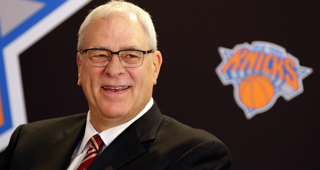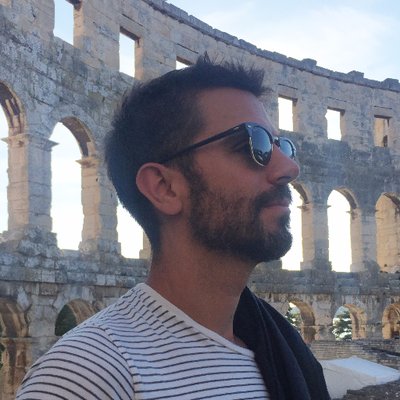In real estate, it's all about location, location, location. For cooking, it’s ingredients, ingredients, ingredients. In the NBA, it's players, players, players.
For most of Phil Jackson's 11 rings, he had the luxury of putting the NBA’s best collection of players onto the floor and became an all-time great coach as much for what he didn't do as what he did. The triangle isn't a gimmick offense for underdogs to find a cheat code like playing 4-on-5 defense; it's a structured system valuing spacing and passing that has been successful in the NBA provided Michael Jordan, Shaquille O’Neal, Kobe Bryant or Pau Gasol are running it.
The ingredients/players inherited by Jackson with the New York Knicks were awful and their location makes properly engaging in a full rebuild of a roster focused on the draft a near impossibility.
The New York Times believes the New York Times deserves a better basketball team to cover.
Jackson isn’t the GM New York needs as much as he’s the one they deserve.
Building an NBA team that is capable of contending for more than one 54-win season with a second round playoff exit takes a level of patience that James Dolan has treated like anathema throughout his ownership. The lone reprieve was the tenure of Donnie Walsh when his job was to clear cap space and accumulate enough complementary pieces to give the Knicks their best shot possible at signing LeBron James.
Isiah Thomas was certainly not a bad GM when it came to player evaluation for the draft, but he ran into franchise-crippling trouble by brazenly trading away unprotected picks and by constantly doubling down by being on the receiving end of salary dumps with the likes of late-career Jalen Rose, Steve Francis and Mo Taylor.
Madison Square Garden cost a fortune to renovate and the Knicks have the most expensive tickets in the NBA. Unlike many of his colleagues across the NBA, Dolan genuinely wants to win but winning in the marketing realm and selling out MSG comes first.
There is a theory amongst Knicks’ fans that the J.R. Smith trade was Jackson sending a Trojan horse to the Cavaliers. LeBron was worth it during that 2008-2010 period in every way imaginable, but they need to fully move on. Even if LeBron were to break Cleveland’s heart a second time and choose the Knicks, you’re getting the lesser version. It wouldn’t be the Tracy McGrady the Knicks put on the floor, but it would be similar to the briefly MVP-like tenure of Amar’e Stoudemire.
The Knicks need a workaholic GM that will blowtorch the roster and concentrate on asset maximization. The blueprint from Isiah to Phil has remained relatively unchanged and the reality of their autonomy without ownership intervention is dubious.
The only way Jackson is worth $12 million per season is if he delivers on the strategy of landing multiple superstar free agents, but he and Pat Riley have bamboozled their respective owners at least a little bit in whether or not their presence matters in a meaningful way. They are both more myth than master at this point. There is a ‘Waiting for Godot’ quality to how the Knicks keep waiting for this right combination of superstars to save the franchise. Jackson at least serves as a comforting caretaker who was around when the Knicks last won, but this succeeding in this direction does not feel at all achievable.
Jackson allowed himself to get stuck in limbo by re-signing Carmelo Anthony on a five-year, $124 million contract instead of helping facilitate a sign-and-trade to either the Chicago Bulls or Houston Rockets that could have brought back assets in return. Jackson tried to convince Anthony to put off free agency until 2015 for when the Knicks had cap space and a clear idea of their next step, but Anthony is the same guy who forced his way to the Knicks in 2011 to get an extension pre-lockout.
Even when Anthony signed the new contract, his camp privately acknowledged the distinct possibility of the Knicks struggling and getting a trade down the road after taking the bigger contract. The odds were always on Anthony taking more money over title chances. That’s who he’s always been dating back to his decision in 2006 to not join his 2003 Draft classmates with an opt out for the 2010 offseason. That decision meant the Knicks were out of assets to trade for Chris Paul a few months later and he didn’t get along with Tyson Chandler for ‘basketball reasons’.
Jackson is shrewd and savvy enough to have had the same thought about getting out of the relationship, but Anthony’s value this offseason as a 31-year-old coming off knee surgery will be substantially less than it was last summer.
The prospect of Anthony becoming the next Stephon Marbury as hometown franchise savior turned persona non grata was not lost on him before he even decided to re-sign. Anthony was sold on Jackson’s vision for the Knicks as being aligned with his, but history is not on their side.
Since 2002, the Knicks have missed the playoffs nine times. The rights to their lottery pick had already been dealt for four of those drafts (LaMarcus Aldridge, Joakim Noah, Gordon Hayward and Dario Saric), while they traded away Jordan Hill during his rookie season to create additional cap space for 2010 and Nene was dealt in 2002 (along with Marcus Camby) for an injured, 27-year-old Antonio McDyess. The Knicks fortunately keep their 2015 lottery pick, but 2016 is going to the Toronto Raptors to pay off the Andrea Bargnani trade.
The Brooklyn Nets are in an even more problematic position in the long-term given their draft pick debits. Gerald Wallace is not wrong calling the Nets’ series of trades for Kevin Garnett, Paul Pierce and Wallace himself as a failed get rich quick scheme. The Nets lost the picks that became Enes Kanter and Damian Lillard in trades and that page of lost lottery picks is expected to get worse when the Garnett-Pierce trade aftermath is settled.
Part of the reason why the Knicks and Nets never allow themselves to be bad for an extended period is because they've already mortgaged away that incentive.
No other NBA franchises are still trying to construct a roster in this way. The Sacramento Kings are probably the closest facsimile, but they are coming at it from the opposite side knowing superstar free agents would never choose to play there and acquiring overvalued contracts is a market inefficiency in their eyes.
Until they roll with being bad for a minute as the Boston Celtics have for the last two seasons and strip down their roster for assets, the Knicks and Nets will always be one LeBron, Chris Paul, Kevin Durant, Marc Gasol, Anthony Davis, Andrew Wiggins, Ben Simmons or LeBron James Jr. away from becoming title contenders.



